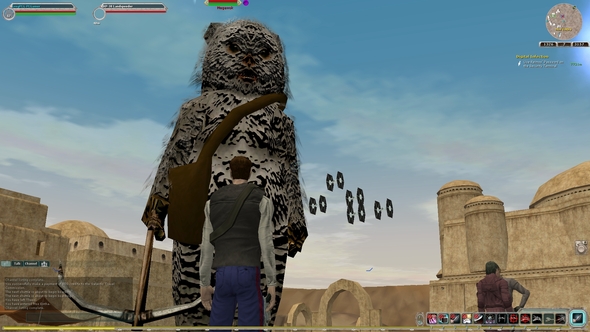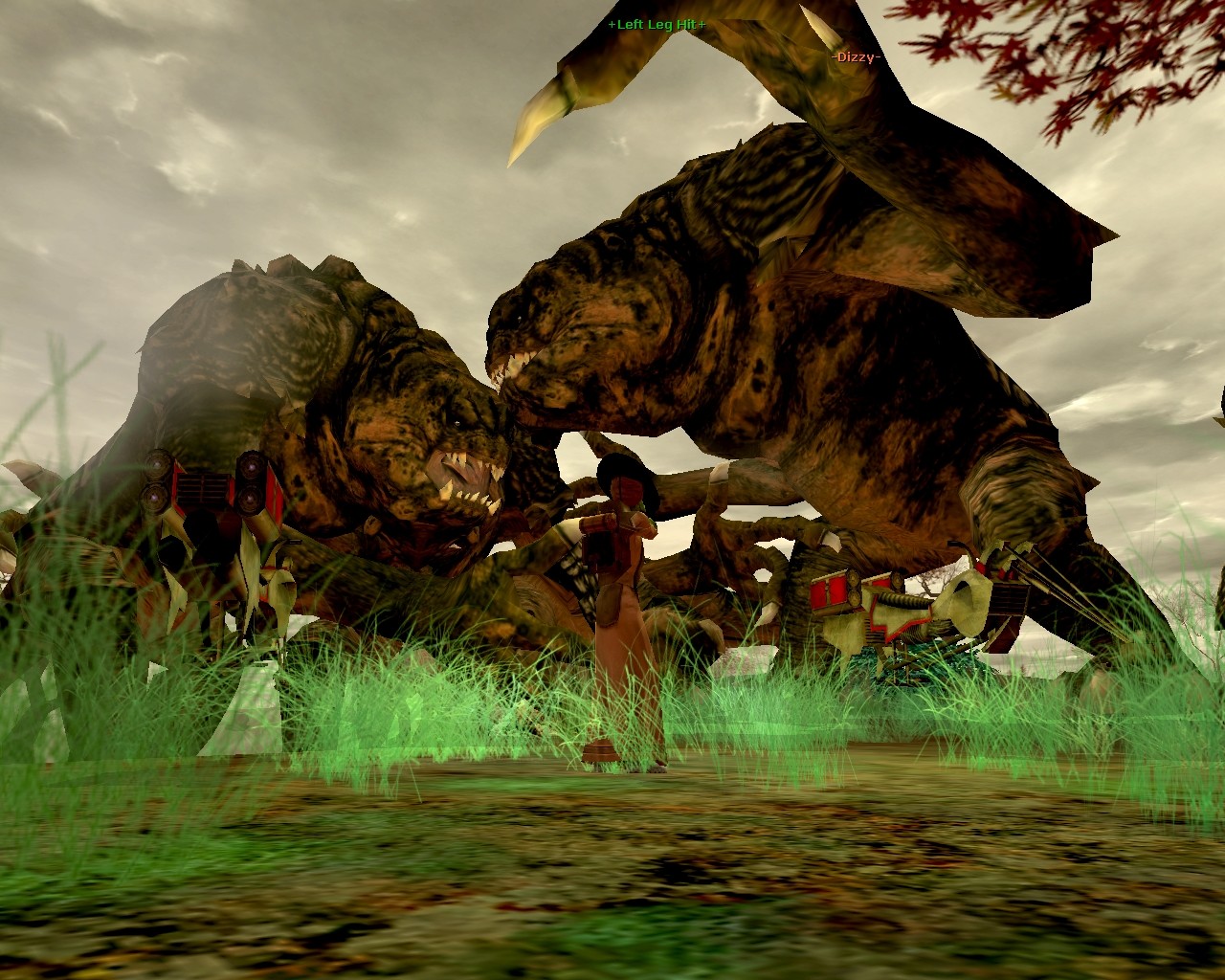

On December 15th, 2011, humans and aliens alike banded together to celebrate, and mourn, the end of Star Wars: Galaxies. Sony Online Entertainment spread news of the final days and let the dev team go nuts. Fireworks blazed ahead over city scapes while colossal, Game Master controlled monsters battled with heroes in the streets as the final hours ticked down. Longtime fans came together with users who hadn’t touched the game in years to watch the universe crumble. It gave players one final chance to say farewell to the places they loved and friends they’d made in the eight and a half years since release. SoE finally pulled the plug at 12:01, ending Galaxies for good.
I have the Galaxies launch discs right here. I could pop them in my machine this very moment, and let it install every character model, every planet, and each feature the game launched with (barring patches, of course). But even if I did, I couldn’t play it. “The servers are down,” it would say. “Try again later.” My machine would send a drifting warble into the depths of space, a lonely cry that would never be answered.
The fate of SWG is sadly not uncommon with games these days, and it illustrates a problem unique to the medium.
Games can straight up die. There is something beautiful about the death of a game, (especially in an MMO’s final few minutes of life, where colossal Ewoks rampage through Mos Eisley, kebabing rodians on a giant spear), but what exactly happens when a game dies? You are left with memories, and a couple of worthless discs. You can’t play these games again. They are forever lost in the sands of time. (Okay, so, that statement wasn’t one hundred percent factual. More on that later, I promise.) Their legacy shall be carried only by wide-eyed storytellers ‘round the bonfire, and on message boards where polarized opinions clash in horrific, yet fascinating, verbal battles.
When a game is gone, you can’t share it anymore. You can’t come back to it years later and see if the contents aged well, or if your affection for the item was genuine or if you were just blinded by nostalgia. What’s more is that we lose a piece of the History of Video Games, denying a slice of our (very young) medium’s legacy. We should be able to preserve and cherish our history. It’s important to take a look back and see how far we’ve come, or to see what made games great years ago.
It didn’t take developers long to leverage the power of the information superhighway to make games. After all, the Internet might very well be the greatest achievement of mankind. Building games around the idea that players from around the world can interact with each other, and with knowledge that the internet itself wasn’t going anywhere, just seems like common sense. That’s where your first dose of online titles, such as Ultima Online and Everquest came into being. While MMO’s (both Ultima Online and Everquest are still running and playable, by the way) are by far the most high profile games to be struck down, the real victims here are the countless co-op games which are unceremoniously taken out behind the shed. Of course, they don’t end as definitively; they just have the online co-op ripped straight from their skeletons.
GameSpy closed its doors this summer. The matchmaking program had been used since 1996 to provide online connectivity services, and in some cases CD key authentication to hundreds of games. This shutdown affected games from a litany of developers, most of which deemed the cost of maintenance too high for older products. “Older” is pretty relative, given the list of games included Borderlands and Red Dead Redemption. Nintendo Wifi even shut down completely in the wake of the GameSpy closure, severing the few Wii and DS games with online multiplayer to be local only.
Couch co-op might be my preferred method of playing, but having online connectivity hacked from a game is bizarre. Take Age of Wonders: Shadow Magic, for instance. This is a game, released in 2003, that lets you connect via the archaic TCP/IP configuration, allowing you to host games directly from your computer. However, if you’ve purchased this fine product on Steam, you can’t connect unless you’re all on the same network. Some titles are just left by the wayside as progress moves on. It’s exceptionally strange that a game I played exclusively online in high school can now only be played by cramming a bunch of computers in the same room.
If we were talking only in terms of stripping online connectivity out of games and leaving local play alone entirely, that wouldn't be much of an issue. Frustrating, perhaps, but it's not a deathblow to these games. That's not what scares me.
Diablo III. Destiny. And (originally) the Xbox One. What do these all have in common?
They all require an online connection to be played, no matter what. And they aren’t MMO’s.
In years past, acquiring video games was a straightforward endeavor. You could skip on down to your entertainment purveyor of choice, slap down a few greenbacks and walk away the proud owner of the latest electronic delight. Barring you tossing your brand new game under an oncoming bus in elation, you had your game, and nobody could take it away from you (except when the unrelenting march of time corrupted your cartridge). Nobody could flip a switch or trip over a server cable to deny access to your game.
So what will happen when Diablo III is deemed too insignificant to be worth server maintenance? The game was built from the ground up for always-online play. Once those servers power down for the final time, will there ever be a way to play the game again? The same question should be asked for Destiny, or any of the other multitudes of games out there requiring a server for confirmation.
I could make a big deal atop a podium and shout “Well, if you paid for it, you should be able to keep playing it!” But that’s not what this is about. It’s about the preservation of our games, and to keep them playable for others to enjoy down the line. Nobody wanted to burn all of the books written before the 1960’s, and we didn’t scrap all the movies released before Citizen Kane. Video games are unique in this problem. Cartridges age. Arcade machines deteriorate. Hardware changes, but software doesn’t always catch up.
I’m not saying online games are bad. They allow developers to design around the concept of multiple people playing them: the very essence of co-operative gaming. They can use persistent worlds that grow when a certain player is offline, and that exist for us all to come together. I am saying that we are presented with some challenges we need to address if we are going to keep the games we cherish playable for years to come.
There are forces at work preventing the loss of these games. Hamachi, a free connectivity tool, allows us to rope any machine connected to the internet into one big ol’ LAN party, addressing the earlier Local Network-only requirements. The folks at GOG.com are in the business of making older titles playable for modern machines. Recently, Game Ranger has stepped in to mend the titles affected by GameSpy’s closure. Even developers themselves come to the aid of preservation, porting their older games to new consoles. Some folks might get uppity at seeing a PSX title available for purchase on their PS3, but it gives younger players the capability to experience games from years back.
Remember when I said “something something forever lost in the sands of time,” followed by saying that wasn’t entirely true? Chances are, you already know what I’m talking about.
You can, with some back-alley deals, still play Star Wars Galaxies. You can even play World of Warcraft, pre-Cataclysm, without ever paying a dime. You could, without too much trouble, find private servers for each and every one of these games which require online connections to play. Governed by an individual or group, these servers allow us to experience the magic of these titles once more, even if their parenting companies have abandoned them. So, problem solved, right? The Dev’s decree “last call,” and we all watch, unified, as the game goes offline. Only for everybody to samba down the street to the private server, where the gameplay’s on the house and the sun never sets.
Except that sort of behavior is illegal under the Digital Millennium Copyright Act.
Remember that big ol’ text thing before logging into a server that you don’t read but click “I AGREE” without another thought? Along with including a bunch of stuff about not being a jerk online, it says you can’t host servers without the explicit permission of the Publisher. Not to assume a whole lot about Publishers, but they aren’t in the market of letting people run their own versions of the game. Business practicalities (e.g. making money) aside, they also don’t want to give people the chance to, in their eyes, “mess up” the game.
There isn’t much precedent for a Publisher shutting down private servers to games which have already been shuttered, though Blizzard issued cease and desist letters to the administrators of many private World of Warcraft servers. However, it is entirely within their right to do so. Sure, you may have payed for the game, you may have tweaked some settings, made some bug fixes, and given your character the ability to summon omnipotent dinosaurs at will. But they made the game, and as a result, own it. They have the right to shut their own game down, much as a painter has the right to set their gallery ablaze in the name of creative inspiration. Even though the only thing left might be ashes, but it's still their ash, and they will do with it what they please.
So, how do we preserve these games to be playable in the future?
It’s really hard to say. We can lobby for older games to be placed in the Public Domain, where they can be run free from the reign of Publishers after a certain period of time. However, much like the endless DRM debate, that brings up a whole new set of issues. We can also hope someone invents server technology efficient enough that it costs an extraordinarily limited amount of money to run, or one that is powered entirely on wishes.
A more realistic approach is appealing to the companies themselves to give us more agency in preserving older games. The folks over at Turbine Entertainment have kept Asheron’s Call going for nearly 15 years. As of August, the game is going Free to Play, but in a different kind of way than how we traditionally think. They are giving players the tools to run their own servers, and leaving it to them to create new content. This might not be a realistic approach from some larger companies, and the new content users create might be entirely divergent across servers, but they have found a legal way to preserve the their game indefinitely.
My concern doesn’t arise because I can’t get my co-op spies on in Splinter Cell: Chaos Theory anymore. It’s because we need to have this history for future games. Developers rise every year with brilliant new game designs, inspired by titles they’ve played before. Do you really want a future in which so many of these classic games are left by the wayside, with only the most current products to draw inspiration from? That would be like a reality in which case the same modern military shooters are released every year, on some kind of horrific endless cycle of repetition, where companies pretend anything released two years ago never happened.
… Oh.